MercoPress. South Atlantic News Agency
Brazil
-
Saturday, May 17th 2014 - 06:58 UTC
Rousseff 'fed up' with Blatter; hopes Brazil win the Cup playing Argentina in the final match

Brazilian president Dilma Rousseff confessed on Thursday evening during dinner with journalists that she is fed up with FIFA chief Joseph Blatter and said the last chapter of protests in the Brazilian cities that will host the World Cup next month were a failure.
-
Friday, May 16th 2014 - 06:45 UTC
Day of marches and protests in Brazil; the Army was sent to impose order in Recife
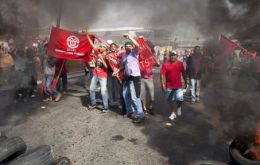
Road blocks and marches hit Brazilian cities on Thursday as disparate groups criticized spending on the upcoming World Cup soccer tournament and sought to revive a call for better public services that swept the country last June.
-
Thursday, May 15th 2014 - 07:16 UTC
Mujica admits Mercosur problems but praises Brazil's open market attitude

In a 'dialogue without ties' at the World Bank President Jose Mujica said that Uruguay is a 'frontier country' which history did not want it to belong to any of the two big neighbors (Argentina and Brazil) so that the Atlantic ocean would not be left to an only country.
-
Thursday, May 15th 2014 - 00:22 UTC
Brazil forecasts 3bn boost to the economy with 3.7 million World Cup visitors

Brazil forecasts that the estimated 3.7 million people expected to visit during the World Cup, including Brazilian and foreign tourists, will boost the country's economy to the tune of 3.03bn. dollars.
-
Wednesday, May 14th 2014 - 04:54 UTC
Rousseff warns about protests during the World Cup: 'they must be peaceful'

President Dilma Rousseff repeated Tuesday that Brazil is “a democratic country” and that its government guarantees the right to “peaceful protest” during the World Cup soccer competition, which begins June 12. However protests must not harm the Cup events in any way.
-
Wednesday, May 14th 2014 - 00:09 UTC
Rio bus drivers on a 48-hour strike leave tens of thousands stranded
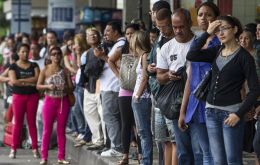
Rio de Janeiro bus drivers on Tuesday began a 48-hour strike that left tens of thousands of people without transportation and caused huge problems in Brazil's second-largest city. Participation in the strike was greater than in the 24-hour effort staged last Thursday when on the streets of Rio scarcely a single bus was to be seen.
-
Tuesday, May 13th 2014 - 18:59 UTC
Several world leaders expected for the coming World Cup in Brazil
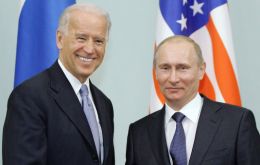
The Brazilian government is counting on a strong presence from world leaders during the football World Cup, which kicks off on June 12. Cristina Fernández, German Chancellor Angela Merkel and US vice-president Joe Biden are among the dignitaries expected to attend.
-
Tuesday, May 13th 2014 - 08:14 UTC
Brazil seals land borders with 30.000 troops ahead of the World Cup
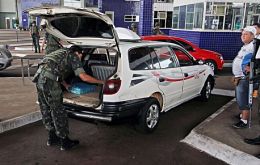
Brazil began deploying over the weekend some 30,000 troops to secure its borders as it prepares to host the World Cup that kicks off next month. The operation involving the army, navy and air force will extend over the 16,900-kilometer frontier separating the South American giant from its 10 neighbors.
-
Monday, May 12th 2014 - 06:48 UTC
Brazil downplays, mathematically, the threat of dengue for Cup tourists

A study by Brazilian experts calculates that, in the worst case scenario, just 100 of the 600,000 foreign tourists who will visit Brazil during the World Cup soccer tourney scheduled to begin in June, or less than 0.02% of the total visitors, will contract dengue during their stay in the country.
-
Monday, May 12th 2014 - 06:38 UTC
Pelé desperate to exorcise Brazil's defeat and loss of the World Cup to Uruguay in 1950
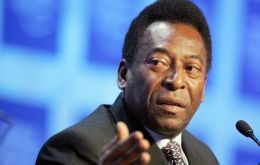
Brazil's Pelé, the legendary attacker believes that his country's national team has the ideal opportunity to exorcise the demons of their 2-1 infamous loss to Uruguay at the Maracana 64 years ago, more precisely 16 July 1950.
